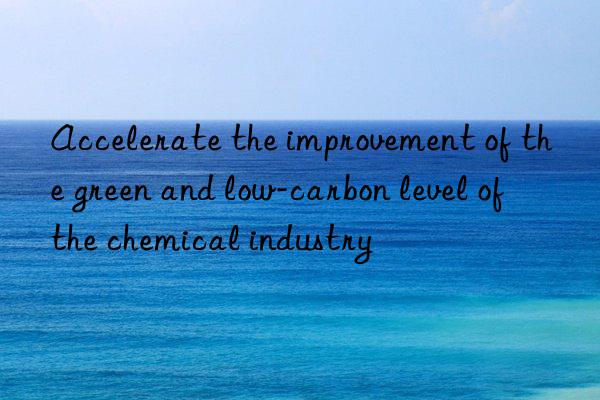
Currently, the carbon emission per unit income of the chemical industry is higher than the average level of the national industrial industry, facing the dual pressure of industrial transformation and upgrading and emission reduction and carbon control. How to reduce the carbon emissions per unit income of the chemical industry? Qiao Xu, member of the National Committee of the Chinese People's Political Consultative Conference and president of Nanjing University of Technology, suggested that we should accelerate the construction of a support system for technological innovation in the chemical industry, realize "self-driven" innovation capabilities, and comprehensively improve the level of green, low-carbon, independent and controllable development of the chemical industry.
On October 24, 2021, the "Opinions of the Central Committee of the Communist Party of China and the State Council on Completely, Accurately and Comprehensively Implementing the New Development Concept and Doing a Good Job of Carbon Neutralization at Peak Carbon Peak" pointed out that it is necessary to deepen the adjustment of the industrial structure and resolutely curb high energy consumption and high energy consumption. Blind development of emission projects, the introduction of coal power, petrochemical, coal chemical and other production capacity control policies; to strengthen the research and promotion of major green and low-carbon science and technology, strengthen the layout of basic research and cutting-edge technology, and cultivate a number of energy-saving carbon reduction and new energy technology product research and development National key laboratories, national technology innovation centers, and major scientific and technological innovation platforms, build a carbon peak and carbon neutral talent system, and encourage colleges and universities to add carbon peak, carbon neutral and related disciplines. This puts forward higher requirements for the transformation of the chemical industry.
Aiming at the current problems in the chemical industry, Qiao Xu suggested that the synergistic effects of ministries and provinces should be brought into play, starting from four aspects: optimizing industrial innovation policies, strengthening the chemical talent team, building collaborative innovation consortiums, and reforming chemical pilot test policies. Support the characteristic development of disciplines in local colleges and universities.
In order to promote the level of green, low-carbon and self-controllable development of the chemical industry, and to reduce the carbon emissions per unit income of the chemical industry, Qiao Xu believes that it is necessary to play the role of capital guidance, and help enterprises and R&D institutions obtain national, provincial and ministerial The scientific and technological projects that have been funded by key scientific and technological plans at the national level shall be supported by supporting funds; more flexible and effective incentive policies for innovative talents shall be implemented, and the introduction and training of high-end chemical talents, urgently needed talents, and talents in characteristic industries shall be encouraged; Build an innovation consortium led by leading enterprises, supported by universities and institutes, and coordinated by various innovation subjects to accelerate the transformation and implementation of scientific and technological achievements; incorporate chemical pilot projects into scientific and technological project management, increase support for elements, strengthen supervision during and after the event, and explore Pilot the public service platform model, explore the introduction of third-party institutions, standardize the approval process, and prevent safety and environmental protection risks.



 微信扫一扫打赏
微信扫一扫打赏
